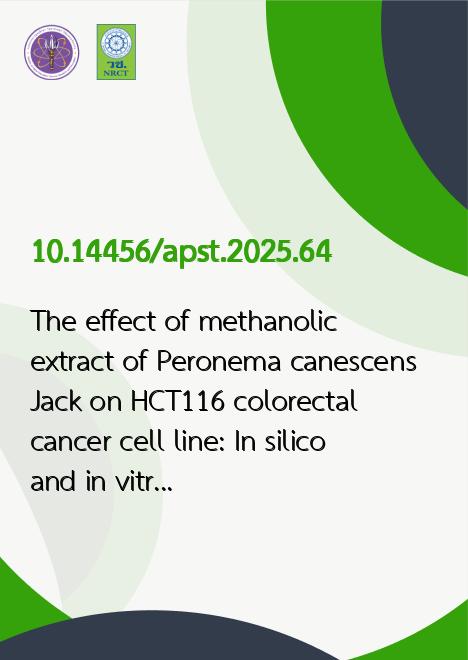
|
The effect of methanolic extract of Peronema canescens Jack. on HCT116 colorectal cancer cell line: In silico and in vitro approaches |
|---|---|
| รหัสดีโอไอ | |
| Creator | Muhammad Priyadi |
| Title | The effect of methanolic extract of Peronema canescens Jack. on HCT116 colorectal cancer cell line: In silico and in vitro approaches |
| Contributor | Rian Ka Praja, Rizki Rachmad Saputra, Reny Rosalina, Decenly, Dwi Hermayantiningsih |
| Publisher | Khon Kaen University, Thailand |
| Publication Year | 2568 |
| Journal Title | Asia-Pacific Journal of Science and Technology |
| Journal Vol. | 30 |
| Journal No. | 4 |
| Page no. | 15 (9 pages) |
| Keyword | Cytotoxicity, Peronema canescens, HCT116, EGFR |
| URL Website | https://apst.kku.ac.th/ |
| Website title | https://apst.kku.ac.th/the-effect-of-methanolic-extract-of-peronema-canescens-jack-on-hct116-colorectal-cancer-cell-line-in-silico-and-in-vitro-approaches/ |
| ISSN | 2539-6293 |
| Abstract | Peronema canescens Jack. as a plant native to the forests of Kalimantan is empirically used by the Dayak community as a traditional medicine to treat various diseases, including its potential as an anticancer agent. Colorectal cancer, one of the cancers that many people suffer from, has the potential to be treated using herbal plants. In various phytochemical studies, the content of secondary metabolite compounds and pharmacological activity of P. canescens have been known in previous research, such as cytotoxic activity against cancer cells. The molecular target involved in the development of cancer is the epidermal growth factor receptor (EGFR), a protein responsible for the process of cancer. This study aimed to investigate the cytotoxic activity of P. canescens leaves on HCT116 colorectal cancer cells and molecular studies on EGFR. The methods used included cytotoxic tests using the neutral red (NR) test and molecular docking tests using Autodock Vina with the target protein EGFR. The results of the cytotoxic test of P. canescens leaf extract on HCT116 cells of 48-hour incubation had an IC50 value of 578.36 µg/mL and P. canescens leaf extract with 72-hour incubation was 400.88 µg/mL. The results of the molecular docking test showed that bioactive compound derivatives of P. canescens, pregnan20-one,3-(acetyloxy)-5,6:16,17-diepoxy-(3α,5α,6α,16α) and resibufogenin, have a high binding affinity to EGFR, with values of -7.9 and -7.8 kcal/mol each, comparable to osimertinib (-8.3 kcal/mol). |